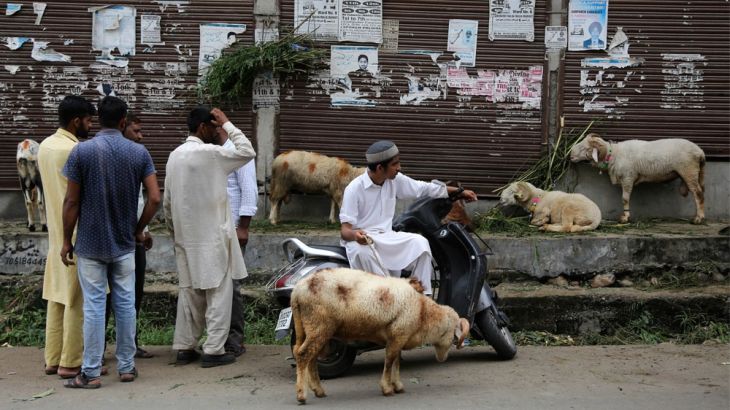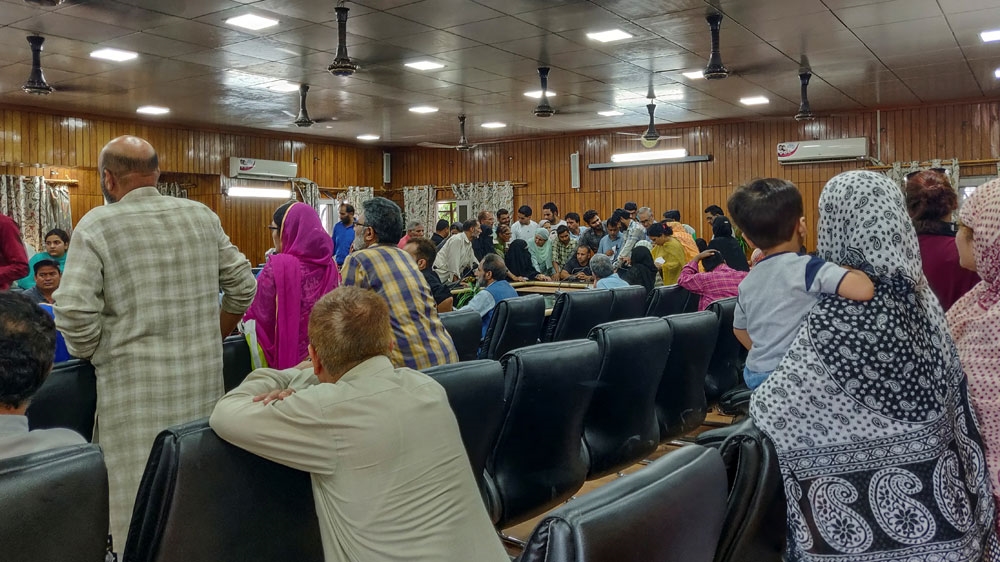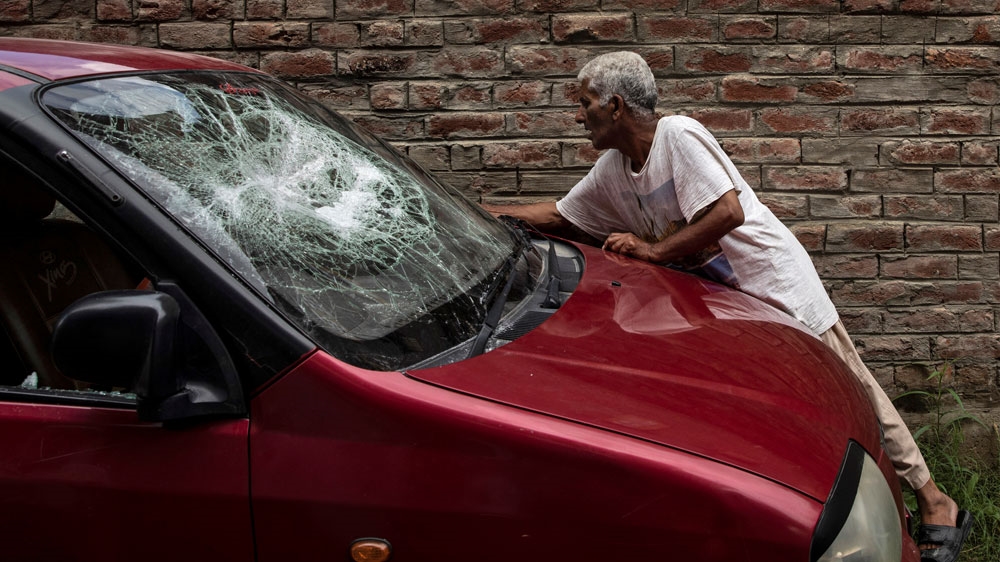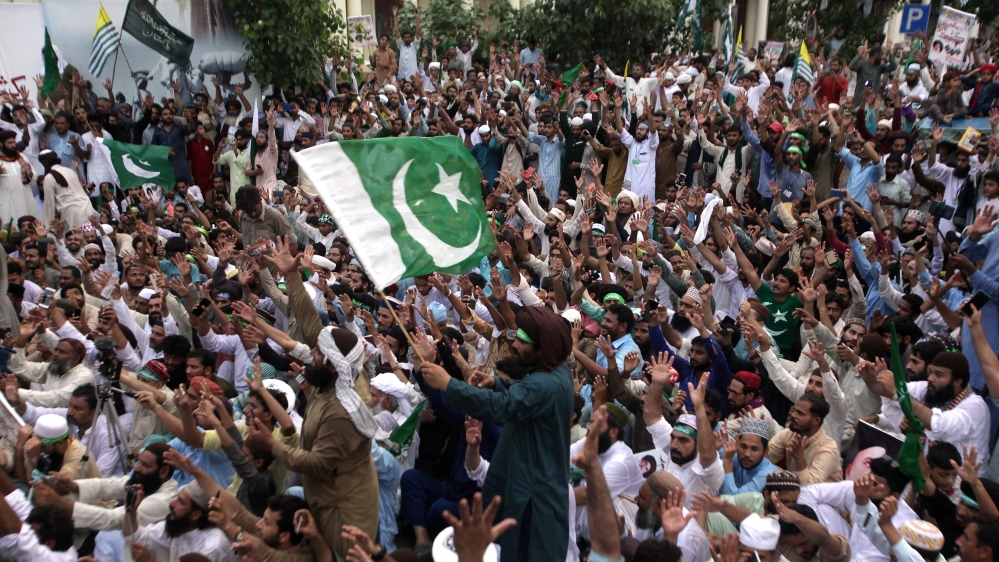Kashmir curfew eased for Eid al-Adha, queues at stores and ATMs
Residents prepare for festival on Monday amid protests over India stripping Muslim-majority region of special status.

Residents of Indian-administered Kashmir‘s main city of Srinagar formed long queues outside cash machines and food stores as Indian authorities briefly eased a crippling curfew now into its seventh day to let the Muslim-majority region prepare for the Eid al-Adha festival.
The indefinite 24-hour curfew – imposed as part of an unprecedented lockdown following the revocation of the special status of the disputed Himalayan region – was relaxed on Saturday.
However, communications lines, including landline phones and internet, remained down, with residents saying they were not able to reach their loved ones during the Eid al-Adha and Hajj pilgrimage.
The curfew was also relaxed on Friday for weekly prayers in parts of Srinagar. Hundreds of residents protested following the prayers, during which some were hurt when police fired tear gas and pellet guns.
Baseer Khan, a top administrative official, said on Saturday that essential commodities including food, grains and meat will be delivered to different parts of the region by Sunday.
Meanwhile, huge numbers of troops remained on the streets, a day after security forces used tear gas to break up a demonstration of thousands of people against the government’s move to revoke Kashmir’s autonomy.

The Eid al-Adha festival on Monday, which marks the end of the annual Hajj pilgrimage in Saudi Arabia, looms as the next big test for the week-old Indian lockdown in the state of Jammu and Kashmir, where the government has ended decades-old rights to property and jobs for local Kashmiris.
Al Jazeera’s Priyanka Gupta, reporting from India’s capital, New Delhi, said: “Restrictions have been eased in at least three areas of Srinagar and large parts of the Jammu region to allow people to do their shopping for Eid celebrations.”
But, internet and phone lines remain cut off, she added.
“People are running out of fuel, because the gas stations are closed, and the pharmacies are running out of stock of critical medical supplies like insulin, but for the time being, people say they do have enough supplies of food and other essentials,” Gupta said.
‘Lives dominated by razor wire’
India’s Hindu-nationalist government on Monday revoked Article 370 of India’s constitution, limiting the region’s decision-making powers and eliminating its right to its own constitution.
The government of Prime Minister Narendra Modi also downgraded Indian-administered Kashmir from statehood to two federally administered territories – Jammu and Kashmir and Ladakh – to be ruled directly by New Delhi.
India sent some 10,000 additional troops to the Muslim-majority region in the lead-up to its announcement on Monday, imposing a paralysing curfew on parts of the territory, shutting down telecommunications and arresting political leaders and separatists.
|
|
On Thursday, Modi said in a televised speech that Kashmiri people would have “no problem” for Eid-al-Adha, or the Festival of Sacrifice.
“We can do more but it is still tough, everyone is closely watched,” one resident told the AFP. “Our lives are still dominated by razor wire and checkpoints.”
“Bank machines are running out of cash, so there are queues at every machine where notes may be available. People also need food for Eid,” added a second resident.
After weekly prayers on Friday, about 8,000 people gathered for a protest on the edge of Srinagar that was broken up by security forces with tear gas and shotgun pellets, residents said.
“About 12 people were hurt, but none seriously,” said a witness.

Pressure from Pakistan
The scrapping of Kashmir’s special status has also heightened tensions with neighbouring Pakistan.
The two nuclear-armed countries claim Kashmir in full, but each governs a portion.
In response to New Delhi’s move, Islamabad expelled the Indian envoy, suspended trade, halted cross-border train services and banned Indian films.
Thousands in Pakistan also staged rallies on Friday, with protesters in the southern city of Karachi setting fire to effigies of Modi, calling him a “terrorist” and criticising the United Nations for its inaction.
Protests also took place in Pakistan’s capital, Islamabad, and in Lahore and Quetta cities.
Pakistan’s foreign minister visited China, which also controls a section of Kashmir, on Friday for hastily arranged talks regarding the issue.

China’s Foreign Minister Wang Yi told his Pakistani counterpart that Beijing was “seriously concerned about the turbulence and escalating tensions” in Kashmir, according to a statement, while offering its support to Islamabad.
“This is just a start of what appears to be a marathon of diplomatic activity that is likely to start within the next few days,” said Al Jazeera’s Kamal Hyder, reporting from Islamabad.
On Saturday, a regional political party from Kashmir petitioned the Supreme Court to strike down the Indian government’s move to scrap the region’s special status and divide the state into two federal territories.
The National Conference, one of the main pro-India political parties in Indian-administered Kashmir, in its plea claimed the move was “illegal”.
An opposition Congress party activist has already filed a petition challenging the communications blockade and the detentions of Kashmiri leaders.